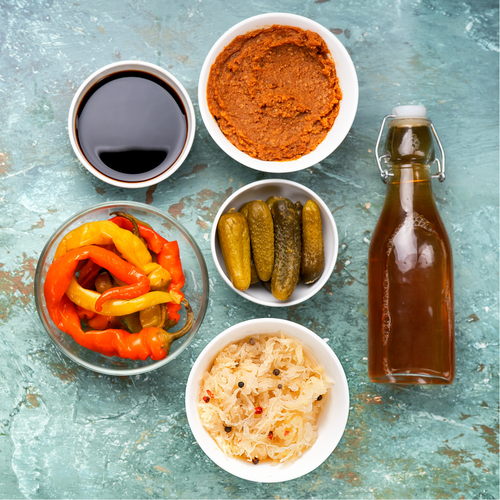Things to absolutely avoid after overeating
A boozy night, burgers and fries, tacos, cake... After indulging, we think we have the right reflexes to "compensate" for the excesses of the night before. But what's the reality? Let's focus on the things to avoid at all costs.
1 - Feeling guilty after overindulging
Did you have a good time? Did you enjoy the food and drinks? That's all there is to it! Feeling guilty doesn't do any good, except to spoil the pleasure of this memory. So take a step back and put things into perspective. Remember that a balanced diet is achieved over an entire week, not just over a day, and even less so over a meal. Everyone has the right to treat themselves from time to time, so let's de-stress!
2 - Skipping a meal to compensate for the excess food of the day before
Often after an excess, we may have the reflex to skip a meal to compensate for the previous day's overeating. But this is a mistake! Excess or not, if the feeling of hunger is present, it is because the body expects to receive energy. By skipping a meal, you will only succeed in frustrating yourself and eating much more than necessary the next meal, which would be counterproductive. Be careful, it is essential to listen to your body. In other words, if the feeling of hunger is not there, do not force yourself to eat either. Trust your body, it knows what it needs.
3 - Forgetting to hydrate after overeating
Water is a valuable ally after overeating and even more so after drinking alcohol. It will allow you to eliminate toxins and waste from your body, particularly by helping the liver to detoxify . In addition to water, you can turn to diuretic drinks such as broths, soups, vegetable juices, infusions, green tea, lemon juice... All of which promote digestion and the elimination of toxins.
4 - Staying on the couch after eating too much
The best thing to do after overeating is to balance the "Energy Intake / Energy Expenditure" scale. Any activity, whether it's a digestive walk or a yoga session, will be beneficial. On the other hand, for the more courageous who would opt for a run or a weight training session, we will pay even more attention to our hydration because the alcohol from the day before will have already severely dehydrated the body.
Be careful, however, it is not recommended to exercise directly after a meal, as this can cause nausea and bloating. It is better to wait at least an hour and a half, or even two hours, after the meal before exercising.
5 - Succumb to your cravings
Often, after an excess of fat or sugar, our body craves more because these are palatable foods, meaning they activate the brain's reward circuit. The best way to avoid succumbing to these cravings is not to resist them too much, but simply to postpone them. In fact, a recent study showed that if snacking urges are postponed long enough, you will eventually stop craving them.
To put it simply, if you have a craving for something sweet, postpone it by telling yourself that you'll have it after you finish your current task. After that time, your brain will have moved on and you'll forget about the craving!
6 - Saying "damned" after overeating
This expression often resonates in our heads after an overindulgence. While focusing on a balanced meal the next day is by far the best solution for feeling good in your body and mind!
The keys to feeling good after overeating
1 - Hydrate well to cleanse the body after excess 💧
Throughout the day, make sure you drink enough to flush your body, avoiding carbonated and/or sugary drinks which cause bloating.
2 - Move to eliminate excess food 🚴🏼
This is the hardest solution to implement after an overindulgence, but undoubtedly the one that will give you the most satisfaction! It can be as simple as walking in the fresh air, or going for a run, but also a few laps in the pool, or even a yoga session.
4 - Eat a balanced and varied diet without restriction 🍌
If you have an irresistible sugar craving that won't go away, then turn to natural sugars like fruit, which, thanks to its fiber, will keep you satisfied until your next meal. Also, focus on a balanced meal . easy to digest. We garnish half of our plate with vegetables, because they are alkalizing and will buffer the acidity generated by excesses, especially alcohol. As for starchy foods, potatoes also have a strong alkalizing power. As for proteins, prefer fish or white meat, which is more digestible than red meat.
Sources :[1] Kenefick RW, Cheuvront SN. Hydration for recreational sport and physical activity. Nutr Rev. 2012 Nov;70 Suppl 2:S137-42. doi: 10.1111/j.1753-4887.2012.00523.x. PMID: 23121349.
[2] Mead NL, Patrick VM. The taming of desire: Unspecific postponement reduces desire for and consumption of postponed temptations. J Pers Soc Psychol. 2016 Jan;110(1):20-35. doi:10.1037/a0039946. PMID: 26727664.
[3] Irwin C, Leveritt M, Shum D, Desbrow B. The effects of dehydration, moderate alcohol consumption, and rehydration on cognitive functions. Alcohol. 2013 May;47(3):203-13. doi: 10.1016/j.alcohol.2012.12.016. Epub 2013 Jan 23. PMID: 23352231.















